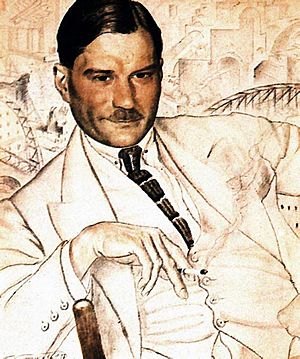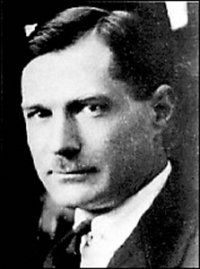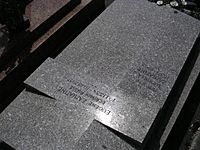Yevgeny Zamyatin facts for kids
Quick facts for kids
Yevgeny Zamyatin
|
|
|---|---|

Yevgeny Zamyatin by Boris Kustodiev (1923).
|
|
| Born | Yevgeny Ivanovich Zamyatin 1 February 1884 Lebedyan, Russian Empire |
| Died | 10 March 1937 (aged 53) Paris, Third French Republic |
| Occupation | Novelist, journalist |
| Genre | Science fiction, satire |
| Notable works | We |
| Signature | |
Yevgeny Ivanovich Zamyatin (Russian: Евге́ний Ива́нович Замя́тин; February 1, 1884 – March 10, 1937) was a Russian writer. He wrote science fiction, philosophy, and political satire. He is sometimes known as Eugene Zamyatin.
Zamyatin's father was a Russian Orthodox priest. Yevgeny became an atheist and a Bolshevik when he was young. The Bolsheviks were a group that wanted to change Russia. He was arrested and exiled many times for his beliefs.
However, Zamyatin also disagreed with the Communist Party after the October Revolution. He used his writing to criticize the Soviet Union's strict rules. He spoke out against the government's control over people's lives. Because of this, he is seen as one of the first Soviet dissidents. A dissident is someone who openly disagrees with their government.
Zamyatin is most famous for his 1921 novel We. It is a very important dystopian science fiction book. A dystopia is a fictional society that is unpleasant or frightening. We is set in a future police state, where the government controls everything.
In 1921, We was the first book banned by Soviet censors. Censorship means controlling what people can read or see. Zamyatin managed to get his book published in other countries. This made the Communist Party very angry. He was then blacklisted, meaning his work was not allowed. He asked Joseph Stalin, the Soviet leader, for permission to leave Russia. He moved to Paris and died there in 1937.
After his death, Zamyatin's writings were secretly copied and shared in Russia. This inspired many other Soviet dissidents.
Contents
Early Life and Education
Yevgeny Zamyatin was born in Lebedyan, Russia, about 300 kilometers (186 miles) south of Moscow. His father was a priest and a teacher. His mother was a musician. Zamyatin remembered being a lonely child. He spent a lot of time reading or listening to his mother play music. He might have had synesthesia. This means he could see colors or qualities for letters and sounds. For example, he saw the letter "Л" as pale, cold, and light blue.
From 1902 to 1908, he studied engineering for the Imperial Russian Navy in Saint Petersburg. During this time, he stopped believing in Christianity. He became an atheist and joined the Bolsheviks.
Revolt and Repression in 1905
Zamyatin was part of the Russian Revolution of 1905. He said that being a Bolshevik then meant choosing the hardest path. In December 1905, he hid explosives in his apartment. The next day, he and 30 other Bolsheviks were arrested.
After being arrested and beaten, Zamyatin sent a secret note from prison. He told his friends to remove anything that could get them in trouble from his room. He spent months alone in prison. He often had nightmares about the explosives he had hidden.
In 1906, Zamyatin was released and sent away to his home area. But he did not like living among the religious peasants there. So, he escaped and went back to Saint Petersburg. He lived there illegally before moving to Helsinki, Finland.
He was arrested and exiled again in 1911. He later wrote his story A Provincial Tale while living alone in the snow.
In 1913, Zamyatin was allowed to return to Saint Petersburg. This was part of a celebration for 300 years of the House of Romanov ruling Russia. His story A Provincial Tale was published. It made fun of life in a small Russian town and made him famous. The next year, he was tried but found innocent for criticizing the army in another story. He kept writing for Marxist newspapers. After finishing his engineering studies, Zamyatin worked as a naval engineer in Russia and other countries.
Time in England
In March 1916, Zamyatin went to the United Kingdom. He was there to help build icebreaker ships. These are strong ships that can break through ice. He worked on ships like the Krassin, which was the most powerful icebreaker for many years.
Zamyatin wrote that England was very different from Germany, which he had visited before. He said it was as new and strange as Alexandria or Jerusalem.
He wrote his story The Islanders while in England. He said he missed the February Revolution in Russia. He returned to Russia just in time for the October Revolution in 1917. He traveled on a ship with no lights to avoid German submarines.
Return to Russia: 1917-1931
Zamyatin's stories The Islanders and A Fisher of Men were published after he returned to Russia. Both made fun of English life.
During the Russian Civil War (1917-1923), Zamyatin's writings became more critical of the Bolshevik party. Even though he was an early Bolshevik, he believed that people needed to be able to speak and think freely. He was against the Party stopping freedom of speech and censoring books and media.
In 1919, Zamyatin wrote that the world is kept alive by "heretics." He meant people who challenge old ideas, like Christ or Copernicus. He said that true literature comes from "madmen, hermits, heretics, dreamers, rebels and skeptics."
The Novel We
Zamyatin wrote his novel We between 1920 and 1921. It is set far in the future. The main character, D-503, is a mathematician. He lives in the One State, a city made mostly of glass buildings. This allows the secret police to watch everyone. Life is planned scientifically. People march together and wear uniforms. They are called by numbers, not names. The society is run strictly by logic.
At the start of the novel, a spaceship called Integral is being built. It will visit other planets. The One State wants to force alien races to be "happy" by accepting its rule. D-503, the spaceship's engineer, starts writing a journal for the ship.
Like everyone else, D-503 lives in a glass apartment and is watched. He meets a woman named I-330. She is different and makes him feel confused. He starts having dreams, which are seen as a serious mental illness in the One State.
I-330 tells D-503 that she is part of MEPHI, a group of rebels. They want to overthrow the One State. She takes him to a wild area outside the city's Green Wall. There, he meets people who live freely, covered in animal fur. MEPHI wants to destroy the Green Wall and bring the city people and outside world together.
Like many dystopian novels, We does not have a happy ending for D-503 and I-330. It ends with a rebellion, and the future of the One State is uncertain. The book suggests that there can never be a "final" revolution. The Soviet government did not allow We to be published.
In his 1921 essay I Am Afraid, Zamyatin criticized writers who only praised the new Soviet government. He said they were like old "Court Poets" who only praised kings. He believed that writers should be able to criticize society. He said that if the Party did not stop its "new Catholicism" (meaning its strict control), Russian literature would only exist "in the past."
In 1923, Zamyatin secretly sent his book We to a publisher in New York City. It was translated into English and published in 1924.
Then, in 1927, Zamyatin sent the original Russian text to a Russian magazine in Prague. Copies of this edition were secretly brought back into the Soviet Union. This made the Soviet government furious. Zamyatin's actions led to a strong attack against him by the Soviet State.
Because of his views and actions, Zamyatin faced increasing problems. He became a target for critics and writers who supported the Party.
On September 24, 1929, Zamyatin resigned from the Union of Soviet Writers. He said he could not stay in a group that helped persecute its own members.
In 1931, Zamyatin wrote directly to Joseph Stalin. He asked for permission to leave the Soviet Union. He wrote that his situation as a writer was "hopeless" and that a "death sentence" had been given to him as a writer at home.
Zamyatin left the Soviet Union in November 1931.
Life in Exile
Zamyatin and his wife moved to Paris, France. Life in Paris was hard for them. They faced money problems and loneliness. Zamyatin did not feel he had much in common with other Russians who had left the country earlier.
Zamyatin helped write the screenplay for the 1936 film The Lower Depths. It was based on a play by Maxim Gorky. Zamyatin also worked on a novel called The Scourge of God, about Attila. He felt Attila's time was similar to his own. He never finished the novel.
Death and Burial
Yevgeny Zamyatin died from a heart attack on March 10, 1937. He died in poverty. Only a few friends were at his burial in a cemetery in Thiais, a suburb of Paris.
His death was not reported in the Soviet press.
Legacy and Influence
After Zamyatin's death, his writings were secretly shared in the Soviet Union. This was called samizdat, or "self-publishing." People would type copies of his books and stories and pass them around. This helped keep his ideas alive.
The Soviet government's anger at Zamyatin for publishing We in the West was remembered by other writers. In 1957, Boris Pasternak took a similar risk. He sent his novel Doctor Zhivago to an Italian publisher. Pasternak said, "You are hereby invited to watch me face the firing squad."
Pasternak faced harsh criticism and was blacklisted, much like Zamyatin. But his decision helped him win the 1958 Nobel Prize for Literature.
Many other Soviet dissidents followed Zamyatin's example. For instance, Alexander Solzhenitsyn used Zamyatin's ideas. In 1973, Solzhenitsyn wrote that the Soviet system demanded people give up their souls. He said humans who want to be human cannot accept this. When the KGB seized his book The Gulag Archipelago, Solzhenitsyn had it published immediately in France. This led to him being forced to leave his homeland, unlike Zamyatin who had a choice.
In 1988, Zamyatin's writings began to be published legally in Russia again. This was part of Mikhail Gorbachev's reforms.
Even after the collapse of the Soviet Union in 1991, Zamyatin's ideas remain important. His warnings against forced conformity and his belief that writers should challenge old ideas still resonate.
Science Fiction Influence
We is often seen as a political satire against the Soviet police state. But it has other meanings too. It can be seen as a critique of optimistic scientific ideas. It also shows ideas from Expressionism and Carl Jung's theories.
George Orwell thought that Aldous Huxley's Brave New World (1932) was inspired by We. However, Huxley said he wrote his book before he knew about We. Kurt Vonnegut said he "cheerfully ripped off the plot" of Brave New World for his novel Player Piano (1952). He noted that Brave New World's plot was taken from Zamyatin's We.
In 1994, We received a Prometheus Award for its importance in science fiction.
The 1921 Russian novel We directly inspired these famous books:
- Aldous Huxley's Brave New World (1932)
- Ayn Rand's Anthem (1938)
- George Orwell's Nineteen Eighty-Four (1949)
- Kurt Vonnegut's Player Piano (1952)
- Ursula K. Le Guin's The Dispossessed (1974)
Images for kids
See also
 In Spanish: Yevgueni Zamiatin para niños
In Spanish: Yevgueni Zamiatin para niños





